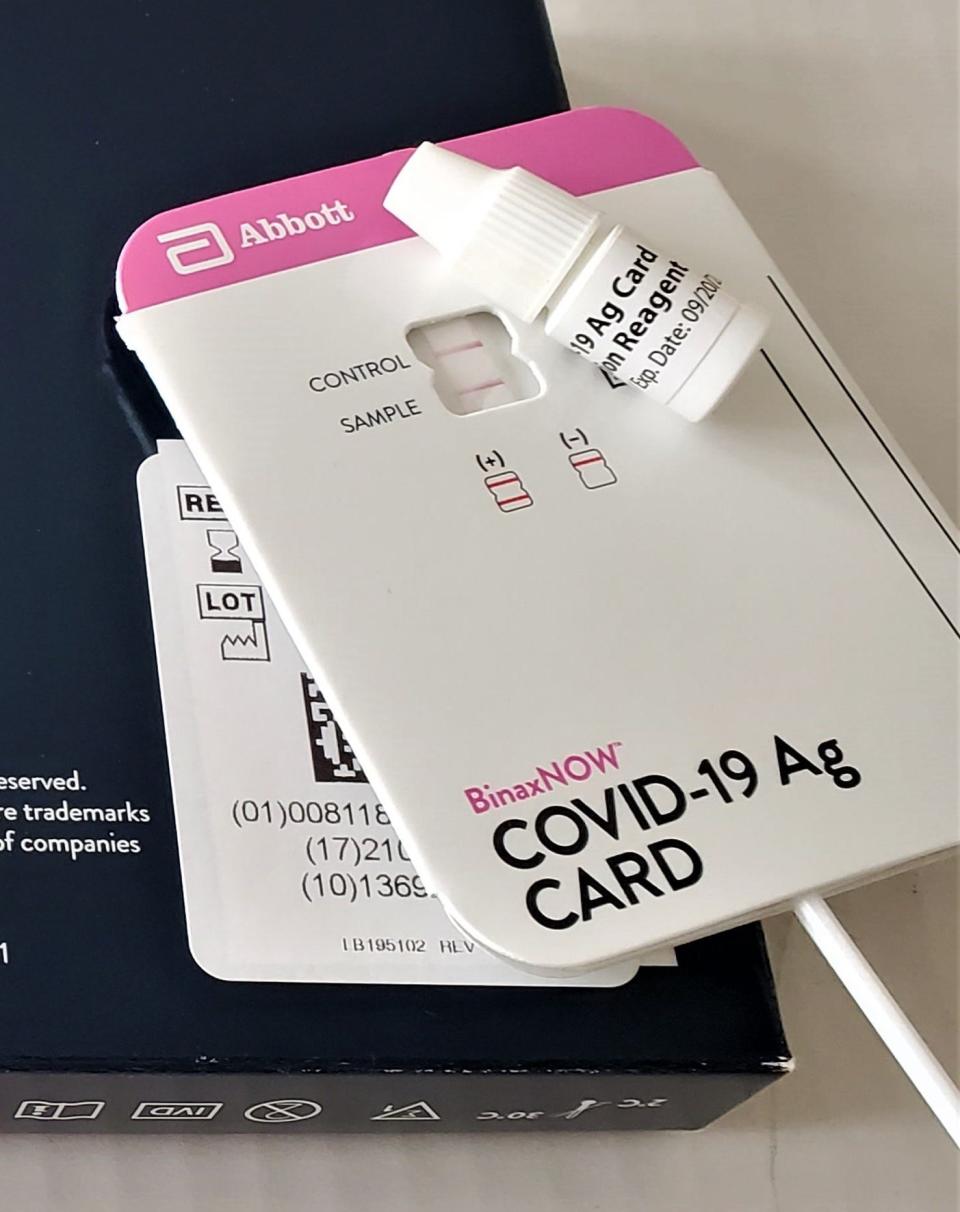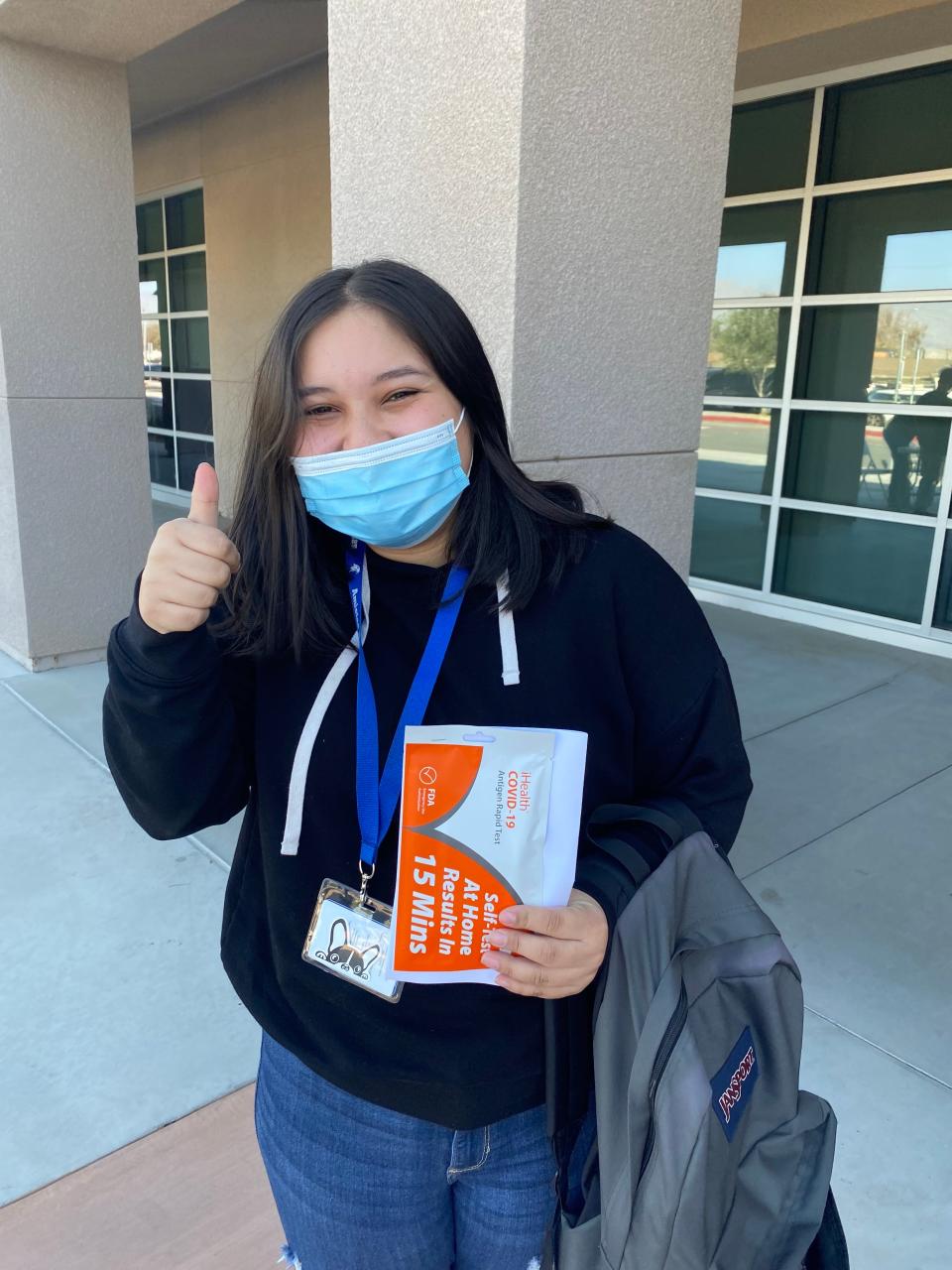Should you report your at-home COVID-19 test results? Here's what state public health says
If you ordered an at-home COVID-19 antigen test kit through the federal government, or got your hands on one in stores, finding out if you have COVID-19 can be done in just minutes.
Over-the-counter COVID-19 antigen test kits include antigen and molecular tests, according to the California Department of Public Health. At-home tests may use a nasal or a saliva specimen.
While they bring convenience, at-home tests have impacted some COVID-19 numbers among local health jurisdictions, especially when people don't report their results. At a recent Riverside County Board of Supervisors meeting, Public Health Director Kim Saruwatari said she believes current COVID-19 case numbers are likely a "large underestimation" because of people either not getting tested or "using antigen tests that don't always get reported to us."
Riverside County reported an additional 1,607 new COVID-19 cases on Thursday. There were also 19 deaths reported, while hospitalizations were at 1,076, down by 33 from Wednesday.
If you test positive with an at-home rapid COVID-19 test, here's what the California Department of Public Health suggests you do.
Related: 'I've tried everywhere': Booked appointments, long lines for COVID-19 testing in Coachella Valley
More: Amid omicron and staffing shortages, tribal health network still testing, boosting patients
Should I report my results?
The California Department of Public Health states people should report their test result according to the instructions recommended by the test. Some home tests have automatic reporting, while others require users to report their results through an app.
If no electronic reporting is available, positive test results should be shared with a health care provider in order to receive appropriate medical care, according to the state.

However, CDPH guidance states tests done in non-supervised settings "are not required to be reported to public health agencies." If they are, data should be "sequestered and not used for case counting." Those with a positive at-home test will be considered a suspect case for surveillance purposes.
Those who do wish to report their test result can visit the California Community Based At-Home Testing website. The website states reporting both positive and negative results will "help your local health department track COVID-19 in your community."
Supervised self tests, which include those sent to labs or those overseen by health care providers, must be reported, whether the results are positive or negative. These will be classified as "probable or confirmed cases."
If a home test kit is used in a school setting and is administered by someone other than the child's parent/guardian, results need to be reported and a waiver is required.

If someone does test positive with an at-home test, the CDPH states they should isolate from others and notify their medical provider.
Do home tests provide accurate results?
Home tests are appealing because they don't need a lab and typically deliver results in about 15 minutes. These antigen tests detect proteins found on the surface of the coronavirus. Laboratory-based PCR tests detect a virus' genetic material, are more expensive and take longer to process.
While lab tests are more sensitive and can detect traces of the virus over a longer period, advocates of antigen tests said the kits can more quickly alert someone who is infectious and at risk of passing the virus to others.
David Walt, a Harvard Medical School professor of pathology at Brigham and Women’s Hospital, said rapid antigen tests are useful but people should also be aware of limitations.
If someone is exposed to COVID-19 and has symptoms but tests negative using a rapid antigen test, the person should repeat the test within two days, But if the same person tests positive, they should believe the results and isolate, Walt said.

The Food and Drug Administration has granted emergency-use authorizations for one dozen antigen home tests. Most of those kits contain two tests with instructions to repeat the tests, usually over about two days. The FDA said it continues to monitor how well these tests detect omicron.
"You absolutely can use these tests effectively if you know your pre-test probability," Walt said.
Those who want to take a PCR test to back up their at-home result should do so as soon as possible, but not longer than 48 hours after the initial antigen testing, according to the Centers for Disease Control and Prevention.
Related: Need a COVID-19 test? Here's where you can get one in the Coachella Valley
Can I use at-home tests for travel?
The Centers for Diseases Control and Prevention requires international air travelers who have not recently recovered from COVID-19 to take a viral test no more than one day before entering the United States. That includes return trips for U.S. citizens and permanent residents.
Travelers can use an at-home test, but it must meet a number of criteria:
It must be either a nucleic acid amplification test (NAAT) or antigen test.
The test must have emergency-use authorization from the U.S. Food and Drug Administration.
Testing must be supervised by a telehealth proctor who can confirm the person’s identity and test results.
Though there are a variety of FDA-approved rapid antigen tests, not all offer services from a telehealth proctor.
Testing options that are suited to international travelers entering the USA include:
Abbott’s BinaxNOW COVID-19 AG Card Home test (note: the company’s BinaxNOW antigen at-home test, which is available over the counter, is not eligible for travel purposes)
Ellume COVID-19 Home Test

How to order a test from the federal government
Those who still need to order a test from the federal government can visit COVIDTests.gov. Every home in the United States is eligible to order four free at-home COVID-19 tests, according to the website.
Once users click on the "Order free at-home tests" button, it will bring them to Usps.com/covidtests. They will enter their contact and shipping address information on the USPS website, and then click "check out now" to place the order. No credit card information is required.
The USPS website states there is a "limit of one order per residential address." Orders will take around 7 to 12 days to ship.
USA Today contributed to this report.
Ema Sasic covers health in the Coachella Valley. Reach her at ema.sasic@desertsun.com or on Twitter @ema_sasic.
This article originally appeared on Palm Springs Desert Sun: What to do if you test positive for COVID with an at-home test

